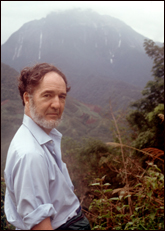What liberals and their allies in the environmentalist wacko movement fail to understand is: their message has gotten out. Their anti-capitalist, socialist, gloom-and-doom, fear-based, lunatic ravings have been amplified — and Americans understand exactly who they are, and what they’re about. As the “Mr. Big” of the vast right-wing conspiracy, I am proud, ladies and gentlemen, to play a major part in the exposé leading to their depression.– Rush Limbaugh April 25, 2005
Currently, about 20 million people tune in to Rush Limbaugh every week. His lingo is now conservative lingua franca. Limbaugh figured out that if you repeat your best lines — e.g., “environmentalist wackos” — often enough, they become more than just funny catchphrases; they become a reconfiguration of reality and a call to arms. In his world (and it’s a world in which a lot of people live), you can’t be an environmentalist and escape wacko-ism.
In Limbaugh, a large group of Americans who felt their country was being taken away from them found an emotional outlet. If his facts didn’t always ring true, his anger did. Limbaug... Read more

